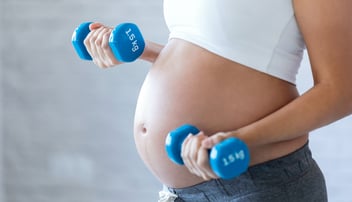How To Eat Healthy During Pregnancy
Pregnancy can be a crazy and beautiful journey for women. Your body will change no matter what, but one part of the change - the weight gain - can be controlled through a healthy, yet nutritious diet. Women should plan to eat an extra 350-500 extra calories a day in the second and especially third trimester.
You can expect changes in breast size, levels of fatigue, or relaxing joints. There may also be uncomfortable parts like morning sickness, ligament stretching, or even the baby kicking your insides.
Through all of this, we want to keep the baby healthy. Since everything you ingest and do is feeding the baby, who cannot feed itself, it's extremely important to monitor what you intake. Poor nutrition during pregnancy can result in an unhealthy weight gain that is more weight on you than the baby needs. Too much weight gain can also cause discomfort, increase in the risk of gestational diabetes, and even potential birth complications.
One common myth is that a pregnant woman is “eating for two.” This is not true. The woman should increase her calorie consumption, for sure, but only by a couple hundred calories--not entirely doubling the amount of calories. On the contrary, underweight women may need to eat significantly more calories because being underweight can be just as dangerous, if not more dangerous, for the baby than being too overweight.
The Nutrients You Need & Where To Get Them
What you, as the mother, put in your body can drastically impact your child’s development. We are going to walk through the different nutrients you need to add or increase to your diet while pregnant.
Medical Disclaimer: Modamily Is not a licensed medical organization. Our advice should not be taken as a substitute for advice from a medical professional. You should consult a doctor during pregnancy to determine the best steps for you and your child’s health.
Folate and folic acid
Why: It can prevent birth defects.
Folate is one of the most important nutrients for child birth that a mother can give her baby. Folate has a form of Vitamin B that is vital in preventing neural tube defects and serious abnormalities of the brain and spinal cord. Folate can be taken as a supplement in the form of folic acid, which can be easily bought over-the-counter. It also has been shown in some studies to prevent early birth.
How much: 400 to 1,000 micrograms a day of Folate or Folic Acid
What to eat for Folate:
- Fortified (added nutrients) cereals by brands like Quaker, KIND, and Kellogg
- Leafy green vegetables
- Citrus fruits
- Beans
- Peas
Calcium
Why: Strengthens bones
Both the mother and the baby need calcium for strong bones and strong teeth. Calcium has other muscular, nervous, and circulatory system benefits as well, but the biggest need for calcium is for your babies rapidly growing bones.
What to eat for calcium:
- Dairy
- Milk
- Cheese
- Yogurt
- Ice cream!
- Sardines
- Beans and lentils
- Almonds
- Whey protein
- Edamame and tofu (soy)
- Figs
- Spinach
- Kale
- Okra
- Collard greens
- Cream soups
Vitamin D
Why: Promotes bone strength
As with Calcium, Vitamin D helps build strong bones and teeth which is vital to your babies healthy development and growth.
What To Eat For Vitamin D:
- Fatty fish
- Salmon
- Tuna
- Mackerel
- Cheese
- Egg yolks
- Mushrooms
Protein
Why: Promotes growth
For the baby to keep growing, you will need to eat lots of extra protein. Just like in our muscles, babies need protein for their muscles to grow, especially in the second and third trimesters when rapid growth occurs.
What To Eat For Protein:
- Chicken
- Pork
- Fish
- Beef
- Tofu
- Beans
- Lentils
- Yogurt
- Milk
- Cheeses
- Seeds
- Nuts
- Eggs
Iron
Why: Helps prevent iron deficiency anemia.
Iron is used to make a protein used in red blood cells to carry oxygen to your tissues. So during pregnancy you need to double that amount because your body needs enough oxygen for two now. When you are pregnant, your body absorbs iron more efficiently and blood volume increases, so you need more iron for yourself to have an adequate supply as well.
Lack of iron can cause deficiency anemia which can lead to extreme fatigue, weakness, or postpartum depression for the pregnant woman. It can lead to serious complications for the baby like early birth or a low birth weight.
What To Eat For Iron:
- liver
- lean red meat
- chicken
- seafood, including oysters
- lentils and beans
- tofu
- fortified breakfast cereals
- dried fruits, such as prunes, figs, and apricots
- nuts
- seeds
- eggs
- soya
- Molasses
- Dark-green leafy vegetables:
- Spinach
- kale
- seaweed
- watercress
- broccoli
- asparagus
- Parsley
Zinc
Why: growth and development, cellular integrity, biological functions like metabolism
What To Eat For Zinc:
- Chicken
- Turkey
- Ham
- Shrimp
- Crabs
- Oysters
- Meat
- Fish
- Dairy
- Beans
- Peanut butter
- Nuts
- Sunflower seeds
- Ginger
- Onions
- Wheat germ
- Rice
- Cereal
- Eggs
- Tofu
- Lentils
Other Nutrients Not to Miss
- Omega 3
- Essential for fetal brain and eye development.
- Whole Grains
- Packed with fiber.
- Carbohydrates
- Energy source
Do-It-All Foods For Pregnant Women
Fish Liver Oil
The oil is very rich in the omega-3 fatty acids which are vital for fetal brain and eye development
Berries
Berries contain water for hydration, healthy carbs, vitamin C, fiber and antioxidants. They are also a great source of natural energy to eat in the morning when you are struggling without caffeine.
Dried Fruit
Eating dried fruit is a way to get condensed nutrients and calories, plus they can act as a laxative. Watch out for the high amounts of sugar, though.
Avocados
This green treat is high in fiber, vitamin B, folate, vitamin K, potassium, copper, vitamin E and vitamin C, as well as providing healthy fats.
Supplements
Sometimes diet is not enough. We recommend taking supplements of some of the essential nutrients like zinc, iron, folic acid, and vitamin D. We also strongly suggest taking prenatal vitamins which can be bought at any drugstore.
We do not recommend taking Vitamin A supplements, though.
Eliminating From Your Diet
Now that we have discussed what to do to your diet and life, let’s walk through some of the things you need to eliminate.
Don’t Eat These Foods
- Mercury
- Found in some seafood
- Vitamin A supplements
- Too much Vitamin A may cause birth defects.
- Unpasteurized food
- Raw meat and fish
Drugs, Alcohol, Smoking
First are the obvious ones. If you have thought about pregnancy at any point before this, you have likely heard you need to cut drugs, alcohol and smoking for the baby. Drugs, alcohol and smoking can cause serious, permanent damage to the baby including lifelong deformities or physical, behavioral, and intellectual problems.
Caffeine
Some moms-to-be claim this was the hardest thing to eliminate from their diet, even more so than alcohol. Caffeine is addictive, and you are likely feeling extra fatigued from the everyday drainage of pregnancy as well as the hormonal changes and iron deficiency. Caffeine may cause the baby to have a low birth weight, which leads to a frenzy of health problems later in life. Caffeine may also increase the chances of having a miscarriage in the first trimester. We recommend trying fruit for the natural sugars and energy boost instead.
To ensure the ultimate safety for your child, you should eliminate household toxins and some essential oils from your life too.
Sources:
Medical News- Which Foods to Eat and Avoid During Pregnancy
Live Science- Pregnancy Diet & Nutrition: What to Eat, What Not to Eat
Live Science- 9 Months, 9 Symptoms: What Pregnancy Really Feels Like



